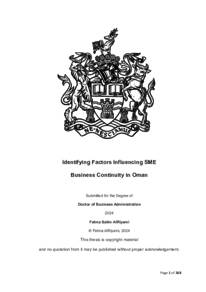Document
Identifying factors influencing SME business continuity in Oman.
Source
Doctoral dissertation
Country
England.
City
Northampton
Publisher
University of Northampton
Gregorian
2024
Language
English
Thesis Type
Doctoral dissertation
English abstract
This study explores Business Continuity (BC) theory and practice, with the main
aim being to identify factors that influence SME BC, while recognising practices and
interventions that sustained the SME landscape in Oman during the COVID-19
pandemic. In addition, the study contributes to SME BC knowledge, practices, and
setting standards in Oman. The primary source of data for the study comes from the
experiences of small and medium enterprises (SMEs) from various industries during
the pandemic, impelled by the lack of research, information, and standards of BC
implementation in Oman.
This exploratory research applied descriptive analysis to help gain invaluable
insight and in-depth understanding of SME BC in Oman using qualitative and multimethod, multi-stage approaches to sequentially collect primary data in three stages.
First, semi-structured interviews were conducted with 10 SMEs funded by the
government, purposively selected from various industries and different governorates
to participate in this exploration. Second, online surveys were conducted using
convenience sampling, where 73 responses were received from a total of 172 invited
SMEs. Furthermore, using the researcher’s business sector networks and
connections, three SME decision makers and practitioners were interviewed to capture
their perspectives and recommendations on the adoption of BC by SMEs.
The results of this study provide clear insights into SME BC practices and the
factors that enable their survival. The findings also support applying BC to reduce the
impact of disasters on SMEs in Oman. In addition, the results indicate that most SMEs
possess a fair understanding of BC enabling factors and apply its practices but in an
unstructured and unplanned way. SMEs find implementing BC vital and relevant to
their business; however, they lack the adequate knowledge and skills to facilitate the
practice and application of BC. Moreover, the results suggest that SMEs acknowledge
the importance of enabling their internal competencies and preparations for external
influences affecting their BC. Lastly, SMEs also find the current national BC
programmes and interventions inadequate and ineffective in facing major crises. The
study therefore calls for greater contribution from the government, interested parties,
and other stakeholders towards building more effective and more reliable SME BC.
The outcome of this study will undoubtedly be valuable to participant SMEs as
they recognise the significance of adapting BC in their business and, in the course of
this study, several have expressed interest in learning and practising BC strategies.
Some practitioners expressed concerns over challenges associated with BC adoption
in SMEs, including SMEs’ readiness, costs, and difficulties of adopting BC processes.
Recommendations have therefore been made for stakeholders regarding committed
actions and interventions to support SMEs.
A further contribution of the current study resides in presenting an empirically
derived inventory of responses and actions undertaken by SMEs during the COVID19 pandemic and identifying factors contributing to their BC. In order to provide a
broader view of the approaches that might help to improve SME BC, and based on
findings from the interviews, surveys, and literature reviews, a framework to improve
SME BC was developed. The proposed framework presents collective actions
required from diverse stakeholders in the business ecosystem at different levels to
improve SME BC, such as global contributors at the macro-level; governments, large
businesses, and supportive interested parties at a meso-level and SME businesses
themselves at the micro-level.
The study also highlights areas for further research in the expansion of BC
knowledge. These areas include exploration of more coping and survival strategies;
assessment of SME regulations and BC interventions in order for SMEs to survive and
attain sustainable competitive advantage in the global and dynamic business
environment.
Category
Theses and Dissertations

